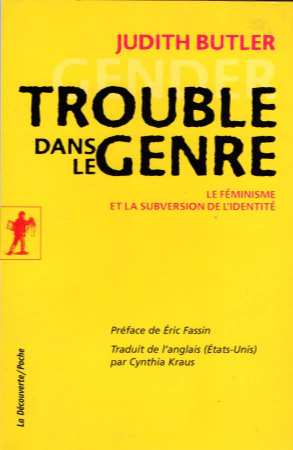Subject of sex/gender/desire
In this first part, Judith Butler establishes the foundations of her vision through the notions of sex, gender, sexuality and desire, using the works of Simone de Beauvoir and Luce Irigary. She explains why there is a disorder in the genre.
Prohibition, psychoanalysis and production of the heterosexual matrix
In this part, she uses the work of Claude Lévi-Strauss, Joan Riviere and Sigmund Freud.
Using the work of Lévi-Strauss, she assumes that incest is an “omnipresent cultural fantasy” and that the fact that it is taboo generates these desires.
Then with Rivière, she explains that imitation and masquerade are the essence of the genre.
Then with Freud’s texts, she says that “gender identification is a form of melancholy in which the sex of the prohibited object is internalized as a prohibition”. And that’s how same-sex identification depends on a homosexual investment in the father.
Finally, Butler explains that for a heterosexual society to be stable, homosexuality must exist, but it must be prohibited.
To sum up, she insists on the productive side of the taboo of incest and on the fact that a law regulates and approves heterosexuality but rejects homosexuality.
'Philosophy and feminism have well studied the cultural associations between the mind and the masculine, between the body and the feminine. Therefore, whenever the distinction between mind and body is reproduced without a critical mind, let us never forget the gender hierarchy that this distinction has traditionally served to produce, maintain and rationalize. ' Judith Butler
Subversive bodily acts
For this part, Butler criticises the vision of some philosophers as:
Kristeva and her body policy
Foucault, Herculine and the politics of sexual discontinuity
Monique Wittig: corporeal disintegration and fictional sex
Conclusion: from politics to parody
In her essay, Judith Butler wants to create a political feminism where the gendered pronoun would not be thought of as representing a natural sex, or would disappear. It also explains that the subject/object difference, being the main concept of feminist women’s struggle is a subject not an object, is a division created by the state. Butler believes that a positive and transformative policy can only emerge by deploying the games of identity and showing that any attempt to “become” someone’s gender is doomed to failure.
However, some of his theory is criticized by different researchers such as biologists, philosophers and feminists. In addition, she has a very heavy and complicated writing style to read.
